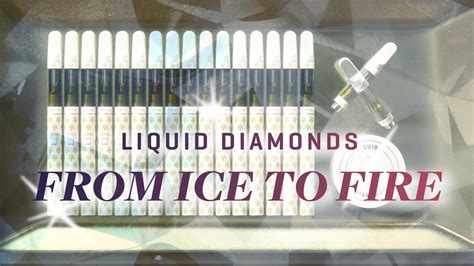How Are Liquid Diamonds Made
Ronan Farrow
Apr 03, 2025 · 3 min read

Table of Contents
How are Liquid Diamonds Made? Unveiling the Science Behind This Fascinating Material
The term "liquid diamond" might conjure images of flowing, shimmering pools of precious gemstones. However, the reality is far more fascinating and complex. It doesn't refer to diamonds in their traditional, solid state that are liquefied. Instead, it describes a unique form of carbon—carbon in a liquid state, achieved under extreme conditions. Let's delve into the science behind this remarkable material.
Understanding the Creation of Liquid Diamonds
Creating liquid diamond isn't a simple process. It requires replicating the immense pressure and temperature conditions found deep within the Earth's mantle. We're talking about pressures millions of times greater than atmospheric pressure and temperatures exceeding thousands of degrees Celsius.
The Role of Pressure and Temperature
The key to forming liquid diamond lies in the interplay of intense pressure and high temperature. Under these extreme conditions, the strong covalent bonds holding carbon atoms together in the diamond lattice structure begin to weaken. At a critical point, the carbon atoms transition from their rigid crystalline arrangement into a fluid state.
Simulating Earth's Interior Conditions
Scientists use sophisticated techniques to recreate these intense conditions in a laboratory setting. Diamond anvil cells are frequently employed. These devices use two precisely aligned diamonds to apply immense pressure to a tiny sample of carbon. Simultaneously, lasers or resistive heating systems are used to generate the necessary high temperatures.
The Challenges of Creating Liquid Diamond
While the basic principle is understood, the actual creation of liquid diamond presents significant challenges:
- Precise control over pressure and temperature: Maintaining the exact balance between pressure and temperature required to achieve a liquid state is incredibly difficult. Slight variations can lead to the formation of other carbon allotropes like graphite or amorphous carbon, instead of the desired liquid diamond.
- Extremely high temperatures: The temperatures involved necessitate the use of specialized and durable equipment capable of withstanding the intense heat and pressure.
- Containment: Keeping the extremely high-pressure, high-temperature liquid diamond contained and preventing it from solidifying or reacting with the surrounding materials is a significant technical hurdle.
Properties and Potential Applications of Liquid Diamond
Though the creation of liquid diamond remains challenging, the potential applications of this unique material are vast and exciting. Researchers believe that liquid diamond could possess exceptional properties:
- Extreme hardness and strength: Its potential for extreme hardness might surpass even that of solid diamond.
- Unique optical properties: It could exhibit unprecedented optical properties, making it suitable for advanced optical devices.
- Revolutionary material science: Liquid diamond could enable the creation of novel materials with unparalleled strength, resilience, and functionality.
Future Research and Implications
The study of liquid diamond is still in its nascent stages. However, continued research into the creation, properties, and applications of this extraordinary material holds the promise of significant breakthroughs across various scientific and technological fields. Further advancements in high-pressure techniques and material science are crucial to fully unlock the potential of liquid diamond and its transformative capabilities. The future possibilities remain exciting and ripe for exploration.
Featured Posts
Also read the following articles
| Article Title | Date |
|---|---|
| How To Use Sport Mode On Jeep Grand Cherokee | Apr 03, 2025 |
| How Beautiful Twila Paris Sheet Music | Apr 03, 2025 |
| Hash In Glass Brother Nature How To Use | Apr 03, 2025 |
| How To Vent A Ventless Fireplace | Apr 03, 2025 |
| How To Write 210 000 In Words | Apr 03, 2025 |
Latest Posts
-
How Fast To Troll Crankbaits For Walleye
Apr 04, 2025
-
How Fast Is Reckless Driving In Ohio
Apr 04, 2025
-
How Fast Is Farm Truck In 1 4 Mile
Apr 04, 2025
-
How Fast Is A Dixie Chopper
Apr 04, 2025
-
How Fast Is 8 Hp
Apr 04, 2025
Thank you for visiting our website which covers about How Are Liquid Diamonds Made . We hope the information provided has been useful to you. Feel free to contact us if you have any questions or need further assistance. See you next time and don't miss to bookmark.
